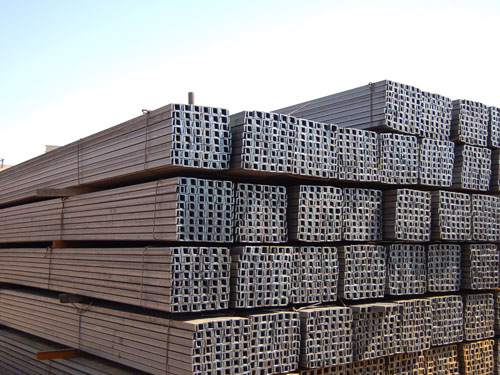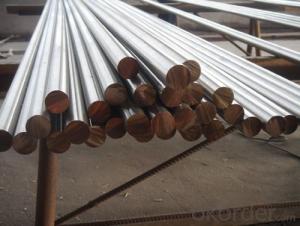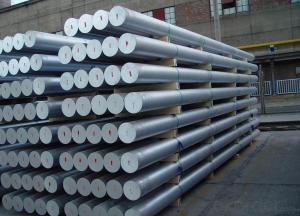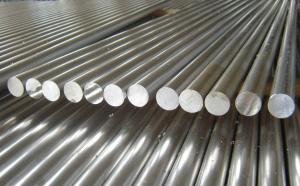Round Steel Bar 5MM-100MM Q195 Q235 Hot Rolled High Quality
- Loading Port:
- China Main Port
- Payment Terms:
- TT or LC
- Min Order Qty:
- -
- Supply Capability:
- -
OKorder Service Pledge
OKorder Financial Service
You Might Also Like
Product Description:
OKorder is offering high quality Hot Rolled Steel I-Beams at great prices with worldwide shipping. Our supplier is a world-class manufacturer of steel, with our products utilized the world over. OKorder annually supplies products to European, North American and Asian markets. We provide quotations within 24 hours of receiving an inquiry and guarantee competitive prices.
Product Applications:
Deformed bar is widely used in buildings, bridges, roads and other engineering construction. Big to highways, railways, bridges, culverts, tunnels, public facilities such as flood control, dam, small to housing construction, beam, column, wall and the foundation of the plate, deformed bar is an integral structure material. With the development of world economy and the vigorous development of infrastructure construction, real estate, the demand for deformed bar will be larger and larger
Product Advantages:
OKorder's Steel I-Beams are durable, strong, and resist corrosion, exact size, regular package, chemical and mechanical properties are stable.
Main Product Features:
· Premium quality
· Prompt delivery & seaworthy packing (30 days after receiving deposit)
· Corrosion resistance
· Can be recycled and reused
· Mill test certification
· Professional Service
· Competitive pricing
Product Specifications:
Manufacture: Hot rolled
Grade: BS4449
Certificates: ISO, SGS, BV, CIQ
Diameter: 6mm,8mm,10mm,12mm,14mm,16mm,18mm,20mm,
22mm,25mm,28mm,32mm,36mm,40mm,50mm
Length: 6M, 9M,12M or as required
Packaging: Export packing, nude packing, bundled
Chemical Composition: (Please kindly find our chemistry of our material based on HRB500 as below for your information)
Grade | Technical data of the original chemical composition (%) | ||||||
C | Mn | Si | S | P | V | ||
HRB400 | ≤0.25 | ≤1.60 | ≤0.80 | ≤0.045 | ≤0.045 | 0.04-0.12 | |
Physical capability | |||||||
Yield Strength (N/cm²) | Tensile Strength (N/cm²) | Elongation (%) | |||||
≥400 | ≥570 | ≥14 | |||||
Theoretical weight and section area of each diameter as below for your information:
Diameter(mm) | Section area (mm²) | Mass(kg/m) | Weight of 12m bar(kg) |
6 | 28.27 | 0.222 | 2.664 |
8 | 50.27 | 0.395 | 4.74 |
10 | 78.54 | 0.617 | 7.404 |
12 | 113.1 | 0.888 | 10.656 |
14 | 153.9 | 1.21 | 14.52 |
16 | 201.1 | 1.58 | 18.96 |
18 | 254.5 | 2.00 | 24 |
20 | 314.2 | 2.47 | 29.64 |
22 | 380.1 | 2.98 | 35.76 |
25 | 490.9 | 3.85 | 46.2 |
28 | 615.8 | 4.83 | 57.96 |
32 | 804.2 | 6.31 | 75.72 |
36 | 1018 | 7.99 | 98.88 |
40 | 1257 | 9.87 | 118.44 |
50 | 1964 | 15.42 | 185.04 |
FAQ:
Q1: How do we guarantee the quality of our products?
A1: We have established an advanced quality management system which conducts strict quality tests at every step, from raw materials to the final product. At the same time, we provide extensive follow-up service assurances as required.
Q2: What makes stainless steel stainless?
A2: Stainless steel must contain at least 10.5 % chromium. It is this element that reacts with the oxygen in the air to form a complex chrome-oxide surface layer that is invisible but strong enough to prevent further oxygen from "staining" (rusting) the surface. Higher levels of chromium and the addition of other alloying elements such as nickel and molybdenum enhance this surface layer and improve the corrosion resistance of the stainless material.
Q3: How soon can we receive the product after purchase?
A3: Within three days of placing an order, we will begin production. The specific shipping date is dependent upon international and government factors, but is typically 7 to 10 workdays.
.
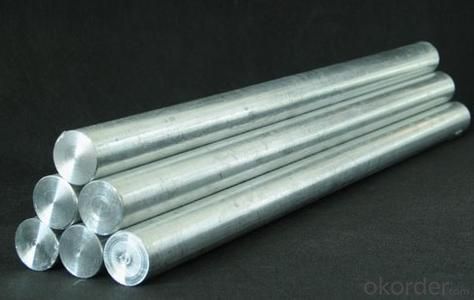
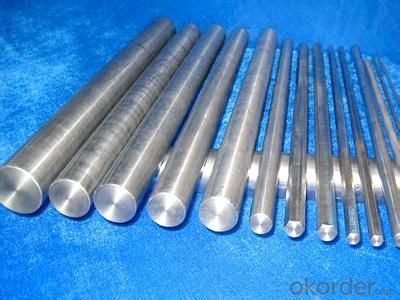
- Q: Can steel round bars be used in the production of construction materials?
- Indeed, the utilization of steel round bars is feasible in the manufacturing of construction materials. Owing to their remarkable robustness and endurance, steel round bars find frequent application within the construction sector. These bars are instrumental in fortifying concrete structures, exemplified by the reinforcement of beams, columns, and slabs, thereby enhancing their resilience and steadfastness. Furthermore, in the construction of buildings and bridges, steel round bars can be employed in the creation of steel frames, trusses, and various structural constituents. The widespread popularity of these bars stems from their adaptability and capacity to endure substantial burdens in the construction industry.
- Q: What is the difference between common wire and high-speed wire?
- Round bar is divided into three parts: hot rolling, forging and cold drawing. Standard Specification for hot rolled round steel is 5.5-250 mm. Of which: 5.5-25 mm small round bars are mostly supplied by straight strips. They are used as reinforcing bars, bolts and various mechanical parts. Round bars larger than 25 millimeters are used mainly for making mechanical parts or for seamless steel tubes.
- Q: How do you calculate the weight of a steel round bar based on its length and volume?
- To calculate the weight of a steel round bar based on its length and volume, you need to know the density of the steel. The density represents the amount of mass per unit volume of the material. The formula to calculate the weight is: Weight = Volume × Density First, you need to calculate the volume of the steel round bar. The volume of a cylinder (which is the shape of a round bar) is given by the formula: Volume = π × (Radius)^2 × Length Where π is a mathematical constant approximately equal to 3.14, and Radius is the radius of the round bar. Once you have the volume, you can multiply it by the density of the steel to find the weight. The density of steel can vary depending on the specific type of steel being used. For example, the density of mild steel is around 7850 kg/m³. Therefore, the weight of the steel round bar is calculated as: Weight = Volume × Density For example, let's say we have a steel round bar with a length of 1 meter and a radius of 0.5 meters. To calculate the weight, we need to find the volume first: Volume = π × (0.5)^2 × 1 Volume = 0.7854 m³ Next, we multiply the volume by the density of steel: Weight = 0.7854 m³ × 7850 kg/m³ Weight = 6171.79 kg So, the weight of the steel round bar would be approximately 6171.79 kg.
- Q: Can steel round bars be used for making turbine blades?
- Using steel round bars to make turbine blades is not possible. Turbine blades experience high temperatures and extreme forces, so they need to be durable and flexible. Steel round bars do not have the required properties to endure these conditions. Usually, turbine blades are constructed from materials like titanium alloys or advanced composites, which have a high strength-to-weight ratio, exceptional fatigue resistance, and thermal stability. These materials are purposely designed to withstand the challenging conditions of turbine operations, ensuring efficiency and reliability.
- Q: What are the cost considerations for steel round bars?
- Cost considerations for steel round bars can vary depending on several factors. Firstly, the type and grade of steel used in the production of the round bars can greatly impact the cost. Different types of steel, such as carbon steel, alloy steel, or stainless steel, have varying costs due to differences in their composition and properties. Higher grade steel with superior strength and durability will generally be more expensive than lower grade options. Secondly, the size and dimensions of the round bars will also affect the cost. Larger diameter and length of the bars will require more raw material and additional processing, resulting in higher costs. Additionally, specialized shapes or custom sizes may require extra manufacturing steps or tooling, which can increase the overall price. The quantity or volume of round bars ordered can also influence the cost. Bulk orders typically benefit from economies of scale, allowing for reduced unit costs. Furthermore, longer-term contracts or partnerships with suppliers can result in better pricing agreements. Transportation and logistics expenses should also be taken into account. The cost of shipping steel round bars can vary depending on the distance, mode of transportation, and handling requirements. International shipping, for instance, may involve additional customs duties and taxes. Lastly, market conditions and fluctuations in the steel industry can impact the cost of round bars. Factors such as supply and demand, raw material costs, and currency exchange rates can all influence the final price. It is important to stay updated with market trends and work closely with suppliers to negotiate favorable pricing. Considering these various factors, it is crucial to conduct thorough research, compare quotes from multiple suppliers, and evaluate the quality-to-price ratio before making a decision. This will help ensure that the cost of steel round bars aligns with your budget and meets your specific requirements.
- Q: Can steel round bars be coated with protective coatings?
- Yes, steel round bars can be coated with protective coatings. These coatings are commonly used to enhance corrosion resistance, improve surface hardness, and provide a barrier against environmental factors such as moisture, chemicals, and UV radiation. The protective coatings can be applied through various methods such as galvanizing, epoxy coating, or powder coating, depending on the specific requirements and intended application of the steel round bars.
- Q: What are the options for joining steel round bars?
- There are several options for joining steel round bars, including welding, using mechanical fasteners such as bolts or screws, and adhesive bonding. The choice of method depends on factors such as the specific application, desired strength and durability, and available resources.
- Q: What are the different grades of steel round bars available?
- Steel round bars are available in various grades, each possessing unique properties and applications. Some commonly used grades include: 1. Mild Steel: This grade is the most affordable and widely used option. It contains a low carbon content, making it easy to weld, cut, and shape. Mild steel round bars are suitable for general construction, fabrication, and manufacturing projects. 2. Carbon Steel: Carbon steel round bars have a higher carbon content compared to mild steel, resulting in greater strength and hardness. They are commonly employed in applications requiring high strength, such as machinery parts, shafts, and axles. 3. Alloy Steel: To improve specific properties, alloying elements like chromium, nickel, manganese, or molybdenum are added to produce alloy steel round bars. These bars offer enhanced strength, toughness, and wear resistance, making them ideal for automotive parts, gears, and tools. 4. Stainless Steel: Stainless steel round bars are corrosion-resistant and possess excellent mechanical properties. They find extensive use in industries like construction, food processing, and medical equipment manufacturing. Different grades of stainless steel, such as 304, 316, or 410, offer varying levels of corrosion resistance and strength. 5. Tool Steel: Tool steel round bars are specifically designed for tool and die production. They exhibit high hardness, wear resistance, and heat resistance. Commonly utilized tool steel grades like D2, A2, or O1 are employed in the manufacture of cutting tools, molds, and dies. Choosing the appropriate grade of steel round bars for your project is crucial and should consider factors such as strength, corrosion resistance, hardness, and machinability. Seeking advice from a steel supplier or an engineer can assist in identifying the most suitable grade for your specific application.
- Q: Can steel round bars be used for making bearings?
- Steel round bars can indeed be used for making bearings. However, it is important to note that the specific type of steel used, as well as the manufacturing process, play a crucial role in determining the suitability of steel round bars for bearing applications. Bearings are typically subjected to high loads and require good wear resistance, low friction, and high durability. Steel round bars made from high-quality alloy steels, such as chrome steel or stainless steel, are commonly used for bearing manufacturing due to their excellent mechanical properties. These steel round bars undergo specific heat treatment processes, such as quenching and tempering, to enhance their hardness, strength, and wear resistance. Additionally, the round bars are typically machined to precise tolerances to ensure proper fit and alignment within the bearing assembly. It is important to consult with materials and manufacturing experts or refer to industry standards to ensure the appropriate steel round bar material and manufacturing processes are used for bearing applications. This will ensure the best performance, reliability, and longevity of the bearings in various operating conditions.
- Q: How do you store steel round bars to prevent damage?
- To store steel round bars and prevent damage, there are several important steps to follow. Firstly, it is crucial to keep the bars in a dry and well-ventilated area to avoid moisture buildup, which can lead to rusting. Moisture can also cause the bars to become brittle and weaken over time. Next, it is advisable to store the round bars horizontally rather than vertically. This prevents warping or bending due to the weight of the bars pressing down on each other. If vertical storage is necessary, it is essential to use appropriate racks or supports that evenly distribute the weight. It is also important to avoid stacking the bars too high, as excessive weight can cause deformation or collapse. If stacking is unavoidable, ensure sturdy supports are used and the weight is evenly distributed across the stack. Additionally, it is advisable to separate different sizes or types of steel round bars to prevent scratching or damage. This can be achieved by using separators or dividers to create distinct compartments for each type of bar. Lastly, regularly inspect the stored round bars for any signs of rust, corrosion, or damage. If any issues are detected, take necessary measures to address them promptly. This may involve applying rust inhibitors, cleaning the bars, or contacting professionals for further assistance. By following these storage guidelines, you can effectively protect steel round bars from damage and ensure their longevity and quality.
Send your message to us
Round Steel Bar 5MM-100MM Q195 Q235 Hot Rolled High Quality
- Loading Port:
- China Main Port
- Payment Terms:
- TT or LC
- Min Order Qty:
- -
- Supply Capability:
- -
OKorder Service Pledge
OKorder Financial Service
Similar products
Hot products
Hot Searches
Related keywords



